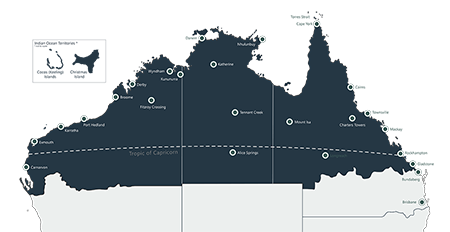The Office of the Australian Chief Veterinary Officer (OCVO) is a team of scientists and policy makers who support the Australian Chief Veterinary Officer (ACVO), Dr Beth Cookson in the delivery of her role and responsibilities.
The ACVO is the primary representative of, and advisor to, the Australian Government on all matters relating to the maintenance and improvement of Australia’s animal health status and the systems that support it.
The ACVO addresses major animal health issues of national interest, such as the threat of antimicrobial resistance (AMR) and enhancing trade and market access for animals and animal products.
What we do
The OCVO, in collaboration with the department and our external stakeholders, works to mitigate the risks and potential impacts of exotic animal diseases and enhance the protection of Australia’s animal health environment.
The ACVO mitigates threats to the Australian economy, and the productivity of Australia’s animal-dependent industries, by supporting and enhancing trade and market access for animals and animal products and representing the Australian Government on animal health issues of national interest.
For the latest updates on the work of the Office of the Chief Veterinary Officer, please follow our X (formerly Twitter) channel @ChiefVetAus. You can also follow updates from the Australian Chief Veterinary Officer Dr Beth Cookson on LinkedIn.
World Organisation for Animal Health (WOAH)
Dr Beth Cookson is Australia’s Delegate to the World Organisation for Animal Health (WOAH, formerly OIE).
The OCVO coordinates Australia’s World Organisation for Animal Health (WOAH) work and draws on the expertise of other Australian government departments and agencies, industry bodies and other experts on the issues under consideration.
About Dr Beth Cookson
Beth Cookson was appointed as the Australian Chief Veterinary Officer and Delegate to the World Organisation for Animal Health in December 2023. Beth graduated from the University of Queensland in 2004 and has more than 15 years’ experience in biosecurity policy and operations at the Department of Agriculture, Fisheries and Forestry; as well as a stint leading frontline community engagement and recovery support functions at the National Recovery and Resilience Agency (now part of the National Emergency Management Agency).
Her veterinary career includes work spanning across the design and delivery of animal health surveillance programs in northern Australia, biosecurity capacity building programs in near neighbouring countries, biosecurity import risk analysis and international trade negotiation.
Beth became a member of the Epidemiology chapter of the Australian and New Zealand College of Veterinary Scientists (ANZCVS) in 2013, and was awarded an Executive Master of Public Administration degree through the Australia and New Zealand School of Government (ANZSOG) in 2022.
Beth is based in Cairns and maintains a focus on northern Australia, including working with industry and strengthening partnerships with our near neighbours as an important part of her role as ACVO.
Antimicrobial resistance
The Australian Chief Veterinary Officer leads Australian agriculture’s response to the global threat of antimicrobial resistance (AMR).
At an international level, the department participates in several multilateral organisations and fora, like the Codex Alimentarius, World Organisation for Animal Health (WOAH) and the Food and Agriculture Organization of the United Nations (FAO) to collaborate on global efforts to combat AMR.
At a national level, the department works with the Australian Government Department of Health and Aged Care and other agencies such as Food Standards Australia New Zealand, the Department of Climate Change, Energy, the Environment and Water and the Department of Industry, Science and Resources, as part of a coordinated response to combatting AMR.
Australia’s National Antimicrobial Resistance Strategy – 2020 and Beyond was published in March 2020. It was developed in collaboration with stakeholders from human and animal health, agriculture, food, and environment sectors. By expanding its scope to include all relevant sectors and with a greater focus on a broad range of antimicrobials (antibiotics, antivirals, antifungals, and antiparasitics), it aims to address the global threat of AMR through a One Health approach.
More information can be found on the Australian Government’s Antimicrobial Resistance website.
Australia’s Animal Sector Antimicrobial Resistance Action Plan 2023-2028
- Australian animal sector stakeholders agreed to provide strategic, national and coordinated support to the Australia’s National Antimicrobial Resistance Strategy – 2020 and Beyond through an industry specific antimicrobial resistance (AMR) action plan.
- Developed by the animal sector for the animal sector, Australia’s Animal Sector Antimicrobial Resistance Action Plan 2023-2028 includes a number of priority activities over seven key objectives that stem from the One Health Master Action Plan and build on the animal sector’s already extensive work to address AMR.
AMR Vet Collective: Veterinary Antimicrobial Stewardship (VetAMS) online learning program
The AMR Vet Collective was developed to translate the science behind antimicrobial resistance (AMR) into easily accessible, practical resources that veterinarians can use to better inform their prescribing decisions. The AMR Vet Collective website includes examples of AMR in animals, as well as prescribing support for veterinarians through decision trees and guidelines, and an online learning program.
The VetAMS online learning program provides educational materials which prepare participants to become leaders in veterinary antimicrobial stewardship. It also provides information to assist in prudent antimicrobial use. Veterinarians can earn Continuing Professional Development (CPD) points for every completed module - a registration requirement designed to ensure veterinarians maintain their skills and knowledge.
The 9 scenario-centred interactive modules of the course were released in 2021 and are available on the www.vetams.org website. An additional poultry-specific module was released in 2022. More industry-specific modules are being developed.
Good news in AMR surveillance
- The department works with major livestock industries to assess the levels of AMR in animals. This includes studies in the pork, chicken meat and egg, barramundi, and salmon industries. The level of AMR was either low or negligible against medicines that are important for humans.
World Antimicrobial Awareness Week 18 – 24 November
World Antimicrobial Awareness Week is celebrated from 18 – 24 November every year, and highlights that AMR is a global human and animal health threat. During this week, the department collaborates with AMR stakeholders to increase awareness and resources for combatting this issue.
For more information go to the department's website on AMR.
Office of the Australian Chief Veterinary Officer – Northern Australia
A strategic focus on Northern Australia
The Office of the Australian Chief Veterinary Officer - Northern Australia provides a stronger Australian Government presence across Northern Australia and strengthened engagement with Northern Australia’s animal industry stakeholders with a focus on building capacity around prevention, preparedness, detection and response to, emergency animal disease threats such as foot-and-mouth disease (FMD) and lumpy skin disease (LSD).
The Northern Australia office also works closely with our regional near-neighbour partners to strengthen and enhance regional animal biosecurity systems to protect livelihoods and limit the impact and spread of emergency animal diseases (EADs).
The small team supporting the OCVO’s work in Northern Australia includes program, policy and veterinary officers based in Cairns and Darwin who will step up regional engagement and influence around animal biosecurity issues unique to the north and the neighbouring region.
Our capacity building partnership with Timor-Leste and Papua New Guinea supports the preparedness and response to significant disease threats such as African swine fever, LSD and FMD. In south-east Asia we have worked with other Australian Government and industry partners to provide support to Indonesia’s response to LSD and FMD, and will continue to work alongside country partners and multilateral organisations to strengthen and enhance regional animal biosecurity systems.
Quick Facts on Northern Australia
- The beef herd comprises 12.5 million cattle and makes up 90% of Australia's live cattle exports.
- Produces more than 94% of Australia’s bananas, 93% of Australia’s mangoes.
- Comprises 53% of Australia's land mass.
- 1.3 million residents or 5.3% of the national population.
- A young and diverse population with a median age of 35-39 years.
- An Indigenous population of over 200,000 or 16% of Northern Australia’s population.
- 78% of the north’s land mass is covered by Indigenous rights and interests.
Source: Office of Northern Australia
Consider a career as an Australian Government Veterinarian
The Department of Agriculture, Fisheries and Forestry is a significant employer of veterinarians in Australia. If you are interested in an exciting, challenging and rewarding career, we encourage you to consider the opportunities that the department can offer.
Find out about becoming an Australian Government veterinarian.
Stay in touch
Read and subscribe to the Three Chiefs Newsletter


